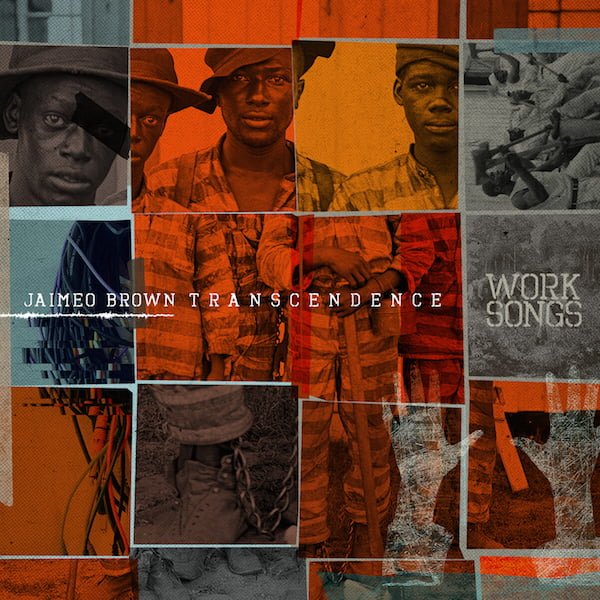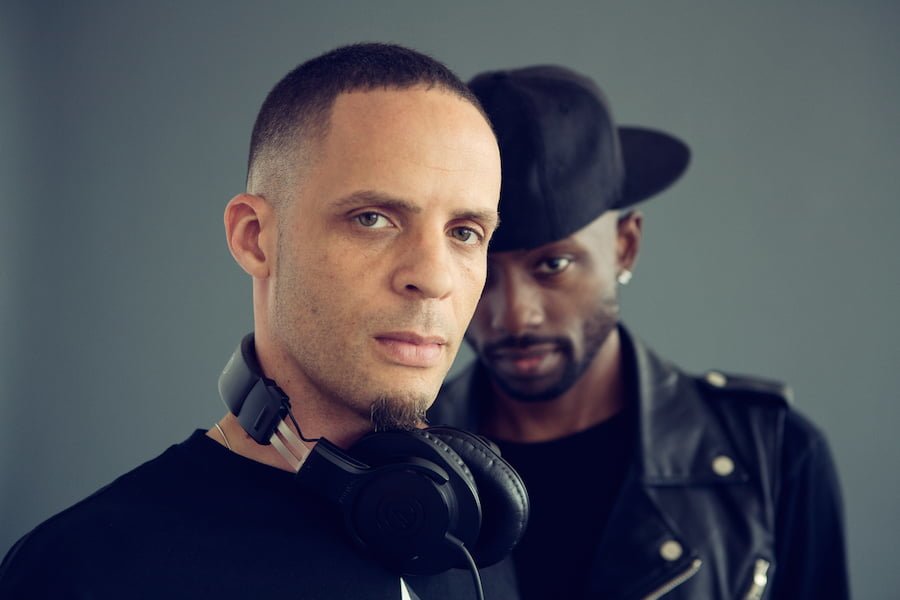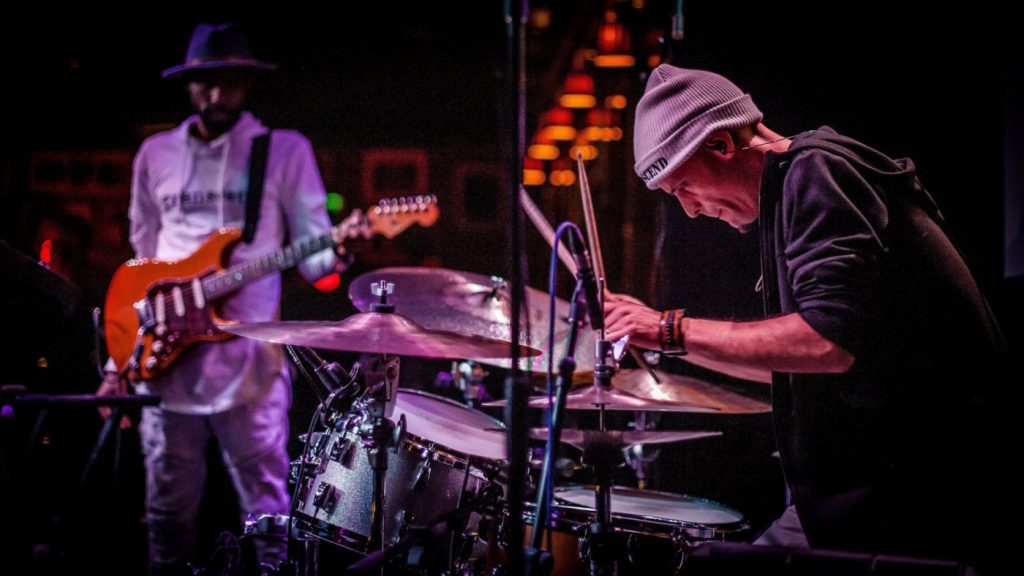
‘Through this music, the Negro is able to dip down into the wells of a deeply pessimistic situation and danger-fraught circumstances and to bring forth a marvellous, sparkling, fluid optimism. He knows it is still dark in his world, but somehow, he finds a ray of light.’ – Martin Luther King
Jaimeo Brown’s Transcendence is a project that breaths life into history. Using Alan Lomax’s original recordings of work songs from the plantations of the American south, recordings from the stonemasons of Japan, and recordings personally collected from the Gee’s Bend quilters of Alabama, the work songs are fused with elements of hip-hop and jazz to form soundscapes that tell stories, that span history, and lead the listener towards the sound of suffering.
At the centre of Transcendence is the drummer and educator Jaimeo Brown (drummer for Stevie Wonder, Carlos Santana, Q-tip, Carl Craig, Kenny Garrett, Geri Allen, Bobby Hutcherson and more) and his long-time friend and collaborator, Grammy award-winning guitarist Chris Sholar (Beyonce, Kanye West, Jay-Z, Frank Ocean, A Tribe Called Quest, Robert Glasper, D’Angelo, Just Blaze, Common, Dr.Dre). Alongside them the project has involved tenor saxophonist Jaleel Shaw, alto saxophonist JD Allen, soul and blues vocalist Lester Chambers, keyboardists Big Yuki and James Fracies and the Gee’s Bend Quilter community.
Their most recent album, Work Songs (Motéma, 2016), was, for me, the most moving album of 2016. I talked to Jaimeo Brown before his second night at Ronnie Scott’s, to discuss the album and his thinking behind it.
How did Work Songs come about?
On this last album I went down to Alabama, Gees Bend and just hung out with the community (African-American community of quilt makers). I just left the recorder on, and everyone just forgot it was on and we just hung out. I ended up getting material that was really sacred to me. When people aren’t necessarily trying to perform, there is a different the energy behind their music. In other cultures there are still traditions of people who use music for community purposes—the music has a different function. How they approach music itself is very different. Work songs, at least in African American history, weren’t for performance.
Your music manages to bring out the way those songs were originally intended to sound, to bring hope, and triumph over oppression. It enables you to feel that the role of music can be more than just entertainment, it can really give hope…
Thank you, it’s humbling for you to say that because the intent of what we are trying to do is more important than the music itself. We’re trying to point to something that is much bigger than our technique, or how much we have learned. The music is a means to an end, the end being pretty much everything you just articulated. It’s a mean world but music has had, from ancient times, this ability to transcend incredible, incredible challenges. It has caused me to really dig deep into that suffering. Life sometimes says: ‘OK… that’s what you want… you asked for it!’ So I have had to dig deep into the African American experience, and even the experience of Japanese stonemasons… (The album features the sounds of the stonemasons, building blocks for the elite class, other workers were in the fields, picking safflowers to get the dye’s from the safflower. The dye that came out was only able to be worn by the wealthy.)

Jaime Brown and Chris Sholar. Motéma Music 2016
How do you collaborate with Chris Sholar?
He’s been such a huge part of the community .That is really how I see Transcendence, it is a community. He’ll send me some music and it won’t be for anything other than, ‘I needed to write this because I’m going through some stuff’. And it will get me through the whole week. It may or may not be used for an album or anything. So it is through community that you are able to build things bigger than on your own. It creates trust. The more trust there is the more you can take risks. And as a community we’ve gone through some challenging things.
Do you mean as a community musicians? As African Americans?
On all levels. Personally, I had a brother-in-law who was shot in the head and killed in front of his family, and… health issues and… life! Everybody goes through things, and that is when songs start to mean more, when you feel life. The hope, in the midst of that heaviness, has to be the end goal. ‘Mean World’ is the first song, but it is not the last.
How do you develop you compositions from the original work song recordings to the end result? How does that process work?
I think it came from a concept first, intellectually, and then it translated into some form of musical field goal. I would say that Transcendence really came from an organic place. I had listened to the Gees Bend music for about 10 years before I did anything with it. I would really listen to it only for my own healing. So, when I started digging into it, I didn’t have any formula to write or compose. I would just feel, and think: how do I create and retain a certain type of mood, while at the same time connect that feeling with other moods that I have. We’re really more connecting moods more than music, in a sense. And maybe there are things that I do unconsciously, all of the time, because I have studied composition and did go to School for Music. But the thing that really drives it is: can I retain a certain feeling.
Ideas start from anything. The great thing about working with Chris is that we both love some many styles of music. We don’t just appreciate it, we really love it! We love hip-hop. So, within our generation of hip-hop, dealing with samples and dealing with production is just part of our worldview. We don’t think about composition in the same way as past generations, because what we consider valid is just what has made us excited about music. A lot of the composition comes from production I would say. But some of the songs come from performance first, since we’re improvisers. Both Chris and I went to School for Jazz, that’s where we met 20 years ago, so it is second nature to not be afraid to be in the air on a tightrope, and to take risks!
If I’m writing harmonically, I’m not thinking about words or the harmony that I’ve learned in school! I sit down and my fingers go to the write emotions. Harmony is just voices, moving voices. So I’m trying to feel the right voices. Incidentally, voices are really a huge theme throughout Transcendence. If you can’t sing it, it probably won’t be on the album.
I’m a singing teacher, and currently studying education at university, so your education work struck a chord with me. How do you see your role as a teaching-artist? (Jaimeo Brown is a teaching artist for NJACP, Arts for Kids and as an ambassador for the US State Department, through Jazz at Lincoln Centre, has taught extensively in Africa and Asia.)
Both of my parents are teaching-artists, I come from education so I do it second nature. It just is all about a story. Teaching to me is like storytelling. I work a lot with urban kids, in Paterson, New Jersey, Newark, New Jersey, and around New York. I’m thankful that I haven’t forgotten what is was like to be a kid in kindergarten or in 5th grade or in college! Because for me that is what drives education, the memory of how people feel. If you know what makes people feel alive you can teach anything. That is what stimulates people. Everybody wants to feel alive. If you force kids to sit at a desk and do things cerebrally for seven hours straight, they may not learn [laughs], they may not learn.

Jamieo Brown at Ronnie Scott’s. Photo credit: Carl Hyde
What do you teach?
I’ve taught everything from West African dance classes, to how rhythm develops community and leadership. I’ve done lectures, I did a TEDx about what 2113 would sound like… it is all connected to the same story. That is just part of having unity in my expression. So yes… I think it is just my responsibility.
I spoke to a businessman last night who, twice a year, makes all of his staff play samba drums! He said, ‘It is actually not as crazy as it sounds, because I wanted to find a way people could appreciate what it feels like to be greater than the sum of your parts’. Does that relate to what you are saying, that music can make you realise what you have in common with people?
Yes! We are always responding to the generation before us and to our culture. I’m really fascinated by the idea of the subconscious. Often I think I am unconsciously responding to what is happening to what is happening in our country, in the environment, and being where I am. And the idea of ‘whole being greater than the sum of its parts’, as you were just talking about, is an idea that, at least in our country is being so lost, on so many different levels.
You mean politically?
In so many different ways. Politically, individualistically, everyone looking after themselves. I was talking to someone on the plane from India and she was saying in her culture they will call all of the neighbours ‘uncle’ or ‘aunt’, whereas in the US they’ll call them ‘James’ or ‘William’! In India they see their neighbours as family, whereas in America they see their neighbours as strangers!
I thought of you the other day when I read a short poem, written at the end of the First World War, by Siegfried Sassoon. It went:
Everyone suddenly burst out singing;
And I was filled with such delight
As prisoned birds must find in freedom,
Winging wildly across the white
Orchards and dark-green fields; on – on – and out of sight
What is it about music that gives you this relief, that relieves the burden?…
We’re always asking: ‘What is our relationship to each other, as human beings?’ A lot of times it is race, religion, culture. But I think Transcendence has revealed to me a different set of dots that connect people together. And everybody feels it and senses it but it is something that I am discovering, and want to bring out and want to celebrate and want to protect.
Work Songs was released on Motéma Music in 2016, available from Bandcamp.
Filed under: Music

Comments